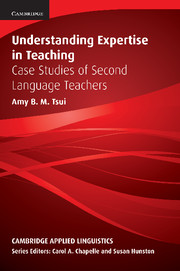Book contents
- Frontmatter
- Contents
- Series Editors' Preface
- Acknowledgments
- Chapter 1 Introduction
- Chapter 2 Conceptions of Expertise
- Chapter 3 Characteristics of Expert and Novice Teachers
- Chapter 4 Teacher Knowledge
- Chapter 5 The Case Studies
- Chapter 6 The Professional Development of the ESL Teachers
- Chapter 7 Teacher Knowledge and Managing the Classroom for ESL Learning
- Chapter 8 Teacher Knowledge and the Enactment of the ESL Curriculum
- Chapter 9 Taking on the Challenge: Exploring Process Writing
- Chapter 10 Understanding Expertise in Teaching
- Appendix 1 Reader's Comment Form on First Draft for the Second Writing Task (Angel's First Draft)
- Appendix 2 Learner Training in Making Revisions
- References
- Index
Series Editors' Preface
Published online by Cambridge University Press: 05 October 2012
- Frontmatter
- Contents
- Series Editors' Preface
- Acknowledgments
- Chapter 1 Introduction
- Chapter 2 Conceptions of Expertise
- Chapter 3 Characteristics of Expert and Novice Teachers
- Chapter 4 Teacher Knowledge
- Chapter 5 The Case Studies
- Chapter 6 The Professional Development of the ESL Teachers
- Chapter 7 Teacher Knowledge and Managing the Classroom for ESL Learning
- Chapter 8 Teacher Knowledge and the Enactment of the ESL Curriculum
- Chapter 9 Taking on the Challenge: Exploring Process Writing
- Chapter 10 Understanding Expertise in Teaching
- Appendix 1 Reader's Comment Form on First Draft for the Second Writing Task (Angel's First Draft)
- Appendix 2 Learner Training in Making Revisions
- References
- Index
Summary
While the nature of expertise has long attracted the attention of researchers in the field of cognitive psychology, until recently it has been relatively less explored in relation to classroom teaching and even less so in the field of second and foreign language teaching. Yet an understanding of how skilled and expert practitioners carry out their work is crucial to many aspects of teacher education. For example, it provides a benchmark against which less successful teaching can be compared. It provides information relevant to the design of teacher education programs. It provides a model of successful teaching that can be used to help understand the difficulties faced by novice teachers. It helps us understand the route novice teachers pass through as they acquire new knowledge and skills, and it helps us better understand the complexity of teaching.
While it is relatively easy to arrive at a common sense understanding of what we mean by expertise, it has proved a somewhat elusive concept for researchers to pin down and investigate. The author of this book has therefore provided a major service to the field of applied linguistics in this first detailed study of what expertise in language teaching consists of and how it develops in language teachers.
Through exploring the classroom practices and knowledge of her subjects in four fascinating and illuminating case studies, Tsui succeeds in clarifying the nature of expertise in ESL teaching, the factors that shape and influence its development, and how teachers employ their expertise in teaching.
- Type
- Chapter
- Information
- Understanding Expertise in TeachingCase Studies of Second Language Teachers, pp. ix - xPublisher: Cambridge University PressPrint publication year: 2003

